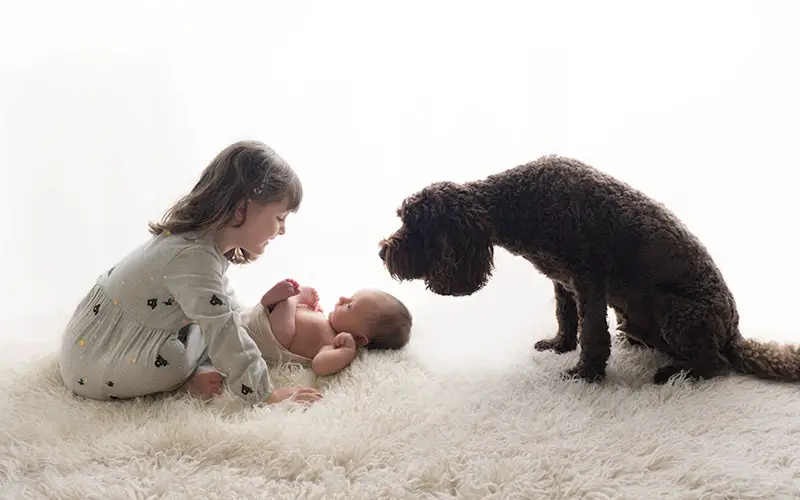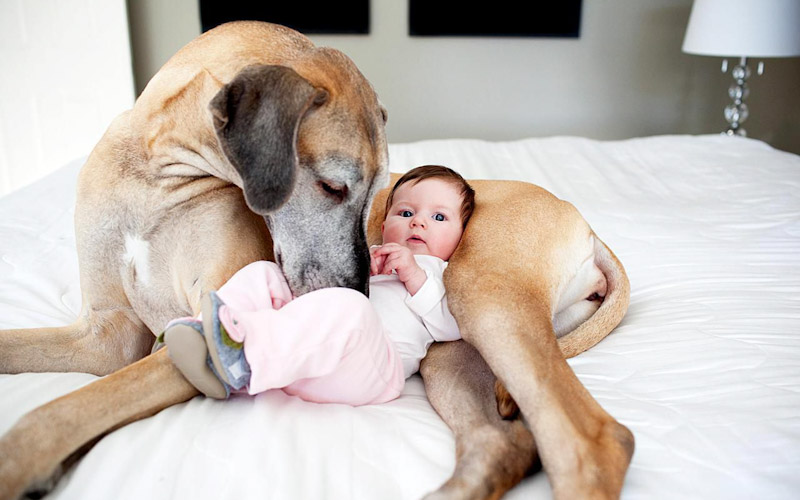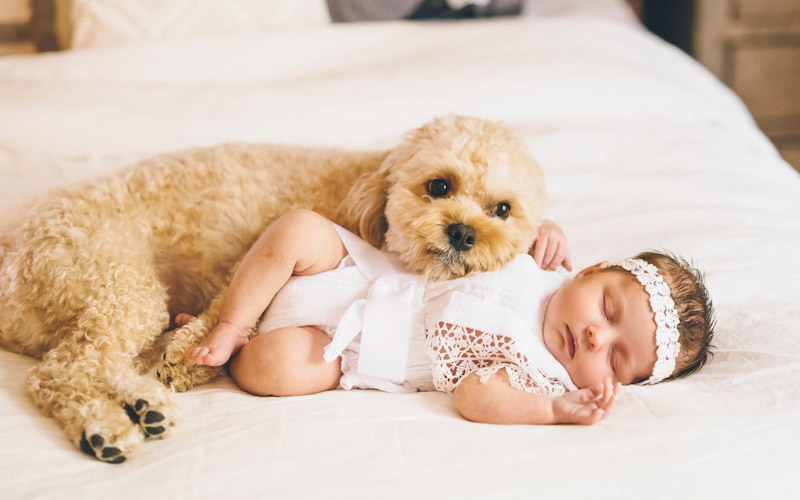Ever wondered if your dog’s intense focus on your newborn is love or obsession? Learn about the heartwarming truth behind their protectiveness and how to foster a safe and loving bond between your furry friend and your child.

Understanding Dog Behavior Around Newborns
Dogs are amazing creatures that can form strong bonds with their human families. They are loyal, affectionate, and sometimes even protective of their loved ones. But how do they react when a new baby arrives in the household? Is their behavior around newborns a sign of love or obsession?
To answer this question, we need to understand the natural instincts of dogs and how they relate to human babies. Dogs are descendants of wolves, and they have inherited some of their behaviors from their ancestors. One of these behaviors is the instinct to protect and care for young pups, which are vulnerable and dependent on their parents.
This instinct can extend to human babies, who share some similarities with dog pups. They are small, helpless, and make high-pitched noises. They also smell different from adults, and dogs can pick up on this. Some dogs may perceive the newborn as a new member of their pack, and feel the need to protect and nurture them.
This can result in some signs of affection and bonding between dogs and newborns, such as:
- Licking the baby’s face or body, which is a way of grooming and cleaning in dogs.
- Sniffing the baby’s diaper, which is a way of checking their health and well-being in dogs.
- Nuzzling or cuddling with the baby, which is a way of showing warmth and comfort in dogs.
- Wagging their tail or making happy noises, which is a way of expressing joy and excitement in dogs.
These behaviors are usually harmless and indicate that the dog has accepted the baby as part of their family. However, not all dogs may react the same way to the arrival of a new baby. Some dogs may feel jealous or anxious about the changes in their environment and the attention they receive from their owners.
This can result in some signs of stress or discomfort in dogs, such as:
- Barking, growling, or snapping at the baby, which is a way of warning or defending their territory in dogs.
- Hiding, avoiding, or running away from the baby, which is a way of coping with fear or uncertainty in dogs.
- Destroying toys, furniture, or other items, which is a way of releasing frustration or boredom in dogs.
- Showing signs of depression, such as loss of appetite, energy, or interest in activities, which is a way of expressing sadness or loneliness in dogs.
These behaviors are usually harmful and indicate that the dog is having trouble adjusting to the new situation. They may pose a risk to the baby’s safety and the dog’s well-being. Therefore, it is important to address them as soon as possible and help the dog cope with the changes.

Fostering a Safe and Loving Relationship
The relationship between your dog and your newborn can be a wonderful one, if you take some steps to foster a safe and loving environment for both of them. Here are some tips on how to do that:
Supervised Introductions
The first step is to introduce your dog and your newborn in a calm and controlled manner. This will help them get used to each other and avoid any negative associations. Here are some guidelines on how to do that:
- Before bringing the baby home, let the dog smell a blanket or an item that has the baby’s scent on it. This will help the dog familiarize themselves with the baby’s smell and prepare them for the meeting.
- When bringing the baby home, keep the dog on a leash and have another person hold the baby. This will help you control the dog’s movements and prevent any sudden or unwanted reactions.
- Let the dog approach the baby slowly and gently, and reward them with praise and treats for being calm and friendly. This will help the dog associate the baby with positive outcomes and reinforce their good behavior.
- Repeat this process several times, gradually increasing the duration and closeness of the interactions. This will help the dog and the baby build trust and confidence in each other.
Positive Reinforcement for Good Behavior
The second step is to reward your dog for behaving well around the baby and discourage them from behaving badly. This will help them learn what is expected of them and how to behave appropriately. Here are some examples of how to do that:
- Give your dog attention, affection, and treats when they are calm and gentle around the baby. This will help them feel valued and appreciated and motivate them to continue their good behavior.
- Ignore or redirect your dog when they are noisy or rough around the baby. This will help them understand that their bad behavior will not get them what they want and encourage them to stop it.
- Never punish or scold your dog for showing signs of stress or discomfort around the baby. This will only make them more fearful or resentful and worsen their behavior. Instead, try to understand the cause of their distress and address it accordingly.
Creating a Safe Space for Both Dog and Baby
The third step is to create a safe and comfortable space for both your dog and your baby. This will help them have their own areas where they can relax and enjoy themselves without disturbing each other. Here are some suggestions on how to do that:
- Provide your dog with a crate, a bed, or a mat where they can rest and sleep. This will help them have a place where they can feel secure and peaceful and retreat to when they need some space.
- Provide your baby with a crib, a playpen, or a mat where they can nap and play. This will help them have a place where they can be safe and happy and explore their surroundings.
- Keep the dog’s and the baby’s spaces separate and respect their boundaries. This will help them respect each other’s privacy and avoid any conflicts or accidents.
When to Seek Professional Help
While most dogs can adapt well to the presence of a newborn, some dogs may have more difficulty than others. This can be due to various factors, such as their personality, their history, their training, or their health. If your dog shows signs of aggression or possessiveness around your newborn, such as:
- Biting, nipping, or scratching the baby, which is a way of attacking or injuring in dogs.
- Guarding the baby, the crib, or the toys, which is a way of claiming ownership or dominance in dogs.
- Staring, blocking, or chasing the baby, which is a way of intimidating or threatening in dogs.
You should seek professional help from a qualified trainer or animal behaviorist as soon as possible. These behaviors are very serious and can endanger the baby’s and the dog’s lives. They require expert intervention and guidance to resolve them.
A trainer or a behaviorist can assess your dog’s behavior and provide you with a customized plan to modify it. They can also teach you how to communicate with your dog effectively and how to handle any potential situations that may arise. They can help you and your dog develop a healthy and harmonious relationship with your newborn.

Conclusion: A Dog’s Love – A Powerful Protector and Companion
A dog’s love for a newborn can be a beautiful thing to witness and experience. It can be a manifestation of their natural instincts to protect and care for their pack members. It can also be a sign of their affection and bonding with their human family.
However, a dog’s love can also be a source of challenge and stress for both the dog and the baby. It can be influenced by their emotions and reactions to the changes in their environment and the attention they receive from their owners.
Therefore, it is important to understand your dog’s behavior around your newborn and to foster a safe and loving relationship between them. By following the tips and advice in this article, you can help your dog and your newborn become the best of friends and enjoy each other’s company.
A dog’s love can be a powerful protector and companion for your newborn. It can also be a wonderful gift for you and your family.
